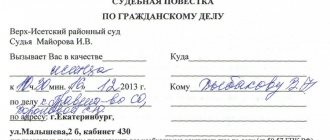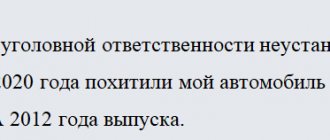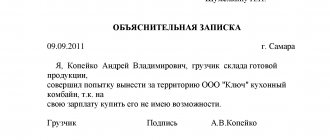Reasons for detention
How long a person can be detained by the police depends on the reasons why he was taken to the police station. The detainee must list them and name the period of temporary restriction of freedom.
Grounds for detaining a citizen by police officers:
- lack of documents;
- suspicion of committing a crime or complicity in it;
- existence of a court decision on detention;
- evasion of punishment;
- entry into a protected area;
- attempted suicide;
- search;
- escape from custody.
The full list of reasons is contained in Art. 14 of the Federal Law “On Police”.
Let us dwell in more detail on the grounds for detaining a citizen by police officers if he is suspected of a crime. In this case, a citizen may be temporarily deprived of his liberty if:
- he was found at the crime scene;
- the citizen was identified by the victim or witnesses;
- They found evidence with traces of blood on him.
Note!
They can only be detained on suspicion of those violations for which imprisonment can be imposed. In other cases, it is prohibited to restrict freedom.
Detention procedure
The police officer is required to introduce himself, stating his position and full name, present his identification, indicate the reasons and time of detention at the police station. The detainee should be allowed to call loved ones, notify superiors, and also contact a lawyer. An employee of the Ministry of Internal Affairs draws up a detention report, a copy of which is given to the citizen.
Lawyers do not recommend signing any papers without your lawyer. Even if the police assure you that these are formal documents, read them from beginning to end so as not to accidentally admit to committing a crime. If a minor is detained, police are required to inform his parents or guardians.
Citizens brought to the police department are kept in specially designated premises. They must meet sanitary standards. The detainees are locked up. Before placing a citizen in a specially designated room, his belongings are inspected. Information about the results of the search is included in the protocol. Detainees are fed and provided with a place to rest at night.
Please note that the police department separately contains:
- persons under 18 years of age and adults;
- suffering from infectious diseases.
It is prohibited to place in special premises:
- seriously ill people;
- persons with moderate or severe diabetes;
- pregnant women;
- citizens with children.
Memo upon arrest
This section provides a reminder of your rights when detained by law enforcement officers, as well as guidelines for action when detained.
-1-
A person cannot be detained for more than 48 hours (Article 22 of the Constitution, Article 14 of the Federal Law “On the Police” dated 02/07/2011 No. 3). In this case, the period of administrative detention should not exceed 3 hours, except if the offense committed entails administrative punishment in the form of administrative arrest (Article 27.5 of the Code of the Russian Federation on Administrative Offenses). The period of detention is calculated from the moment of actual restriction of the person’s freedom of movement (clause 4 of article 14 of the Federal Law “On the Police”). After 48 (or 3 in the case of administrative detention) hours from the moment of detention, the detained person is subject to release, unless a preventive measure has been chosen against him within the framework of criminal or administrative proceedings.
-2-
When contacting a police officer, he is obliged to perform the following actions: 1) state his position, rank, last name, present his official identification at the citizen’s request, and then state the reason and purpose of the appeal; 2) if measures are applied to a citizen that restrict his rights and freedoms, explain to him the reason and grounds for the application of such measures, as well as the rights and obligations of the citizen arising in connection with this; 3) explain to the person detained his right to legal assistance, the right to the services of an interpreter, the right to notify close relatives or close persons about the fact of his detention, the right to refuse to give an explanation (clause 4 of article 5, clause 3 of art. 14 Federal Law “On Police”).
-3-
A detained person, as soon as possible, but no later than three hours from the moment of detention, has the right to one telephone conversation in order to notify close relatives or close persons about his detention and location. Such notification, at the request of the detained person, can be made by a police officer (Clause 7, Article 14 of the Federal Law “On the Police”).
-4-
After the suspect is brought to the body of inquiry or to the investigator, a detention report must be drawn up within no more than 3 hours, in which a note is made that the rights of the suspect have been explained. The protocol indicates the date and time of drawing up the protocol, the date, time, place, grounds and motives for the detention of the suspect, the results of his personal search and other circumstances of his detention. The arrest report is signed by the person who compiled it and the suspect (Article 92 of the Code of Criminal Procedure of the Russian Federation).
-5-
The suspect may be subject to a personal search. A personal search of a person is carried out only by a person of the same sex and in the presence of witnesses and specialists of the same sex, if they participate in this investigative action (Article 184 of the Code of Criminal Procedure of the Russian Federation).
ATTENTION! Often, it is during a personal search that law enforcement officers can commit illegal actions (provocations) against a detained person. If you are sure that you do not have any prohibited items on you, demand the presence of witnesses from the very beginning of the search. Then it will be much more difficult to commit illegal actions. It is important to pay attention to the witnesses and write down their details. In case of illegal actions, this must be reflected in the protocol.
-6-
A detained person has the right to use the services of a lawyer (defender) and an interpreter from the moment of detention (Article 46 of the Code of Criminal Procedure of the Russian Federation, paragraph 5 of Article 14 of the Federal Law “On Police”).
-7-
The detainee has the right to refuse to testify (Article 51 of the Constitution of the Russian Federation - no one is obliged to testify against himself, his spouse and close relatives).
WARNING: We strongly recommend that you refrain from testifying until your attorney arrives. Only after building a line of defense can you give evidence!
-8-
The detainee has the right to give testimony and explanations in his native language, which he speaks (clause 6, part 4, article 46 of the Code of Criminal Procedure of the Russian Federation).
-9-
The detainee has the right to receive medical care in necessary cases (Part 1 of Article 29 of the Fundamentals of the Legislation of the Russian Federation on the protection of the health of citizens).
-10-
The suspect has the right to receive a copy of the decision to initiate a criminal case against him, or a copy of the arrest report, or a copy of the decision to apply a preventive measure against him (Clause 1, Part 4, Article 46 of the Code of Criminal Procedure of the Russian Federation).
-11-
Detainees are kept in specially designated premises under guard in conditions that exclude a threat to their life and health. Before placement in specially designated premises and after the end of the period of detention, detained persons are subject to inspection, the results of which are entered into the detention protocol.
Detention for 48 hours
Let's look at why someone can be detained for 48 hours. This is possible if law enforcement officers have reason to believe that the citizen is involved in breaking the law. In two days, the Ministry of Internal Affairs must confirm this with facts or release the detainee.
It is important to know how long the police can detain you to clarify the circumstances in the following cases:
- a citizen committed an offense in internal waters, a special economic zone;
- the citizen violated customs rules;
- a person illegally crossed the border of the Russian Federation.
The maximum period for these situations is 48 hours. The same will be the maximum time for police detention if a person suspected of an administrative offense is detained, for which arrest or deportation from the country may be imposed.
It is important to know not only how long the police can detain you, but also from what point this period is calculated. For example, if we are talking about a drunk citizen, then the period begins from the moment he sobers up.
After 48 hours, events may develop according to one of the following scenarios:
- the court makes a decision to select a preventive measure;
- the time of detention is extended for exceptional reasons;
- the citizen is released.
Note!
The released person is given a certificate confirming that he was in police custody for two days. It may come in handy at work.
In what cases are they delayed for 3 hours?
Let's consider in what cases a detention of 3 hours is possible. The main reason is to clarify the identity. This means that the citizen aroused suspicion among the police, but he did not have any documents with him. In this case, law enforcement officers can take him to the department.
If during this time it turns out that the citizen is on the wanted list, is suspected of a crime, etc., the time of detention by the police will increase. In addition, a person who was drunk in a public place may be detained for three hours.
After three hours, the detainee must be released if:
- suspicions were not confirmed;
- there are no grounds for detention;
- during the arrest, the requirements of the law were violated.
Remember that if you exceed the time of police detention without reason, you have the right to demand immediate release.
My husband was taken to the police, what should I do?
The first and most important thing is to look for a criminal lawyer and invite him to participate and review the case as soon as possible. Until the arrested “husband” meets with his lawyer, he must remain, if possible, calm and, preferably, silent. There are all legal grounds for this.
In principle, you need to understand and remember that the one who carries out the interrogation or inquiry is not a friend at all, does not wish anything good to the detainee, he only pursues his goal - to collect as much evidence of guilt as possible and obtain confessions as soon as possible. Therefore, there is no need to regard the investigator’s “consulting services” as a desire to help - this is not entirely true.
There really is a desire to help, but not the detainee, but yourself. Before the lawyer arrives, the arrested person:
- has the right to remain silent;
- has the right not to sign any documents;
- has the right to study in detail what he is offered to sign.
The absence of any action on the part of the detainee can become an ideal basis for the subsequent work of the lawyer. Simply because you don’t have to prove that the detainee was under pressure, he couldn’t accurately express his thoughts, he didn’t choose the right wording, he meant something else, etc. The work of an independent defense lawyer significantly increases the chances of avoiding a preventive measure in the form of detention and In general, the outcome of the case will be much more favorable.
How long can the police detain without charge?
If a citizen is suspected of a crime, the time of detention can be extended to 72 hours. This is possible based on a court decision. The maximum time of police detention is 120 hours (5 days). After this, the detainee must be released due to the fact that the suspicions were not confirmed, or some kind of preventive measure must be chosen against him. The court may impose house arrest, release the person on his own recognizance, etc.
We answered the question of how long they can be held in police custody without charge. Next, we will consider how to behave when detained.
How to find out if a person has been taken to the police station?
If you have even the slightest suspicion that your relative may have been detained, you should call your local (district or city) police department as soon as possible using public information numbers. State the name of the person you are looking for and if he is really arrested, find out on what basis, by whom and when - this information must be provided to you.
Also ask who you spoke with on the phone, their name and rank. Next, the surest step would be to find an independent lawyer so that the rights of the detained citizen are fully respected, evidence of innocence is collected before he is presented for arrest, and not after, when your relative or friend ends up in a pre-trial detention center.
Rights of the detainee
To protect your interests, you need to know how long police officers have the right to detain. It is also important to understand what the detainee has the right to.
Note!
Even if the reasons for the detention seem insufficient to you, you do not agree with the actions of the police, do not argue with them, especially do not resist or use force. Insults are also not the best solution. For all this you can receive severe punishment.
Calmly ask the employee to introduce himself, make sure he is on duty. Find out the reason for the detention and how long the police are going to detain you.
The detainee has the right to:
- receiving a copy of the protocol;
- refusal to testify;
- calls to a lawyer and meetings with a defense lawyer;
- providing evidence of your innocence;
- filing complaints.
To avoid violation of your interests, we recommend that you contact a qualified lawyer. Remember that police officers may be held liable for illegal detention.
What can be given to the detainee?
If a person is detained, this usually happens unexpectedly. Close relatives and acquaintances naturally want to help the detainee and donate some food, clothes and hygiene products. What can you give to a detainee?
Products, things and objects that pose a danger to life cannot be transferred. Lists of what a person can have with him are posted in the premises for receiving deliveries.
As a rule, the following is allowed to be transferred:
- toilet paper
- loose tea
- granulated sugar
- smoking tobacco, cigarettes
- things, bed linen
- other food products, objects and things
You can always clarify with the investigator or interrogating officer what is allowed to be handed over to the detained person.
In addition, detainees can be given money that is, as it were, in an account and the person can dispose of it by purchasing goods in the store of the pre-trial detention center, but this applies to persons for whom a preventive measure has been chosen and they are placed in a pre-trial detention center.
The transferred food products, things, items are checked by police officers to ensure that they do not contain prohibited items and substances. For example, cigarettes break, just like bread; bulk products are poured, etc. That is, when handing over things, objects, you must remember that they will be checked by police officers and not try to hand over something prohibited.
Write questions in the application on the website or call if you need the help of a criminal lawyer.








